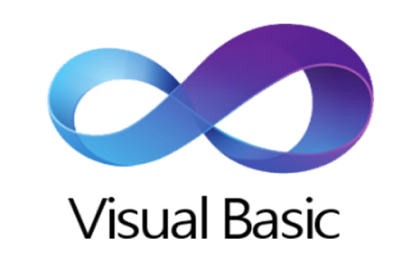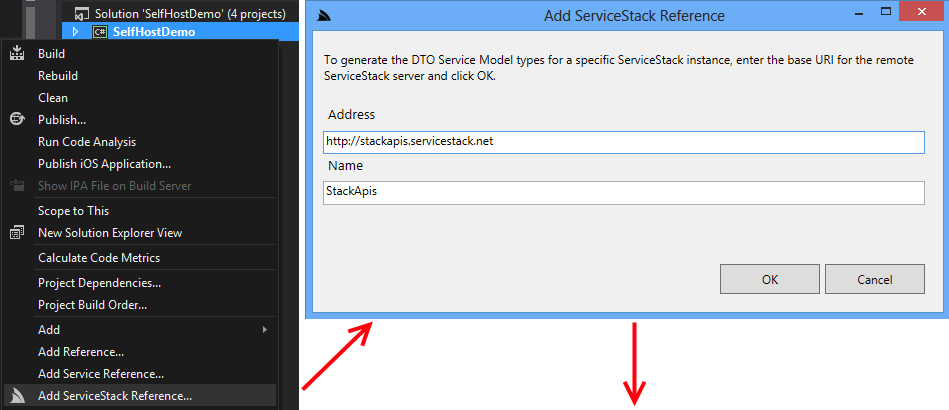VB.Net Add ServiceStack Reference
This page has moved to docs.servicestack.net

ServiceStack's Add ServiceStack Reference feature allows clients to generate Native Types from directly within VS.NET using ServiceStackVS VS.NET Extension - providing a simpler, cleaner and more versatile alternative to WCF's Add Service Reference feature that's built into VS.NET.
The article outlines ServiceStack's support generating VB.Net DTO's - providing a flexible alternative than sharing your compiled DTO .NET assembly with clients. Now VB.Net clients can easily add a reference to a remote ServiceStack instance and update typed DTO's directly from within VS.NET - reducing the burden and effort required to consume ServiceStack Services whilst benefiting from clients native language strong-typing feedback.
The easiest way to Add a ServiceStack reference to your project is to right-click on your project to bring up ServiceStackVS's Add ServiceStack Reference context-menu item. This opens a dialog where you can add the url of the ServiceStack instance you want to typed DTO's for, as well as the name of the DTO source file that's added to your project.
After clicking OK, the servers DTO's and ServiceStack.Client NuGet package are added to the project, providing an instant typed API:

With the VB.Net code generated on the Server, the role of ServiceStackVS's Add ServiceStack Reference is there just to integrate the remote VB.Net DTO's into the clients VS.NET project. This is just getting the generated DTOs from the server with default options set by the server and adding them locally to your project within Visual Studio.

If your server has been updated and you want to update to client DTOs, simply right-click on the DTO file within VS.NET and select Update ServiceStack Reference.

The header comments in the generated DTO's allows for further customization of how they're generated where ServiceStackVS automatically watches for any file changes and updates the generated DTO's with any custom Options provided. Options that are preceded by a VB.Net Class comment ''' are defaults from the server that can be overridden, e.g:
' Options:
'Date: 2014-10-21 00:45:05
'Version: 1
'BaseUrl: http://stackapis.servicestack.net
'
'''MakePartial: True
'''MakeVirtual: True
'''MakeDataContractsExtensible: False
'''AddReturnMarker: True
'''AddDescriptionAsComments: True
'''AddDataContractAttributes: False
'''AddIndexesToDataMembers: False
'''AddGeneratedCodeAttributes: False
'''AddResponseStatus: False
'''AddImplicitVersion:
'''InitializeCollections: True
'''AddDefaultXmlNamespace: http://schemas.servicestack.net/typesTo override these options on the client, the comment has to be changed to start with a single ' instead of triple '''. This convention is due to VB.Net not having block quotes. For example, if we did't want our classes to be partial by default for the VB.Net client, our options would look like below.
' Options:
'Date: 2014-10-21 00:45:05
'Version: 1
'BaseUrl: http://stackapis.servicestack.net
'
'MakePartial: False
'''MakeVirtual: True
'''MakeDataContractsExtensible: False
'''AddReturnMarker: True
'''AddDescriptionAsComments: True
'''AddDataContractAttributes: False
'''AddIndexesToDataMembers: False
'''AddGeneratedCodeAttributes: False
'''AddResponseStatus: False
'''AddImplicitVersion:
'''InitializeCollections: True
'''AddDefaultXmlNamespace: http://schemas.servicestack.net/typesOptions that do not start with a ''' are sent to the server to override any defaults set by the server.
The above defaults are also overridable on the ServiceStack Server by modifying the default config on the NativeTypesFeature Plugin, e.g:
//Server example in CSharp
var nativeTypes = this.GetPlugin<NativeTypesFeature>();
nativeTypes.MetadataTypesConfig.MakeVirtual = false;
...We'll go through and cover each of the above options to see how they affect the generated DTO's:
Adds the partial modifier to all types, letting you extend generated DTO's with your own class separate from the generated types:
Public Partial Class GetAnswersAdds the virtual modifier to all properties:
Public Partial Class GetAnswers
...
Public Overridable Property QuestionId As Integer
End ClassAdd .NET's DataContract's ExtensionDataObject to all DTO's:
Public Partial Class Hello
...
Implements IExtensibleDataObject
...
Public Overridable Property ExtensionData As ExtensionDataObject Implements IExtensibleDataObject.ExtensionData
End ClassAddReturnMarker annotates Request DTO's with an IReturn(Of T) marker referencing the Response type ServiceStack infers your Service to return:
Public Partial Class GetAnswers
Implements IReturn(Of GetAnswersResponse)Original DTO doesn't require a return marker as response type can be inferred from Services return type or when using the
%ResponseDTO Naming convention
Converts any textual Description in <Description> attributes as VB.Net class Doc comments which allows your API to add intellisense in client projects:
'''<Summary>
'''Get a list of Answers for a Question
'''</Summary>
Public Class GetAnswersDecorates all DTO types with <DataContract> and properties with <DataMember> as well as adding default XML namespaces for all VB.Net namespaces used:
<Assembly: ContractNamespace("http://schemas.servicestack.net/types", ClrNamespace:="StackApis.ServiceModel.Types")>
<Assembly: ContractNamespace("http://schemas.servicestack.net/types", ClrNamespace:="StackApis.ServiceModel")>
...
<DataContract>
Partial Public Class GetAnswers
Implements IReturn(Of GetAnswersResponse)
<DataMember>
Public Overridable Property QuestionId As Integer
End ClassPopulates a DataMember Order index for all properties:
<DataContract>
Public Partial Class GetAnswers
...
<DataMember(Order:=1)>
Public Overridable Property QuestionId As Integer
End ClassRequires AddDataContractAttributes=true
Emit <GeneratedCode> attribute on all generated Types:
<GeneratedCode>
Public Partial Class GetAnswers ...Automatically add a ResponseStatus property on all Response DTO's, regardless if it wasn't already defined:
Public Partial Class GetAnswers
...
Public Overridable Property ResponseStatus As ResponseStatus
End ClassLets you specify the Version number to be automatically populated in all Request DTO's sent from the client:
Public Partial Class GetAnswers
Public Overridable Property Version As Integer
Public Sub New()
Version = 1
End Sub
...
End ClassThis lets you know what Version of the Service Contract that existing clients are using making it easy to implement ServiceStack's recommended versioning strategy.
Lets you automatically initialize collections in Request DTO's:
Public Partial Class SearchQuestions
Public Sub New()
Tags = New List(Of String)
End Sub
Public Overridable Property Tags As List(Of String)
...
}This lets you change the default DataContract XML namespace used for all namespaces:
<Assembly: ContractNamespace("http://my.types.net", ClrNamespace:="StackApis.ServiceModel.Types")>
<Assembly: ContractNamespace("http://my.types.net", ClrNamespace:="StackApis.ServiceModel")>Requires AddDataContractAttributes=true
- Why ServiceStack?
- Important role of DTOs
- What is a message based web service?
- Advantages of message based web services
- Why remote services should use separate DTOs
-
Getting Started
-
Designing APIs
-
Reference
-
Clients
-
Formats
-
View Engines 4. Razor & Markdown Razor
-
Hosts
-
Security
-
Advanced
- Configuration options
- Access HTTP specific features in services
- Logging
- Serialization/deserialization
- Request/response filters
- Filter attributes
- Concurrency Model
- Built-in profiling
- Form Hijacking Prevention
- Auto-Mapping
- HTTP Utils
- Dump Utils
- Virtual File System
- Config API
- Physical Project Structure
- Modularizing Services
- MVC Integration
- ServiceStack Integration
- Embedded Native Desktop Apps
- Auto Batched Requests
- Versioning
- Multitenancy
-
Caching
-
HTTP Caching 1. CacheResponse Attribute 2. Cache Aware Clients
-
Auto Query
-
AutoQuery Data 1. AutoQuery Memory 2. AutoQuery Service 3. AutoQuery DynamoDB
-
Server Events
-
Service Gateway
-
Encrypted Messaging
-
Plugins
-
Tests
-
ServiceStackVS
-
Other Languages
-
Amazon Web Services
-
Deployment
-
Install 3rd Party Products
-
Use Cases
-
Performance
-
Other Products
-
Future
